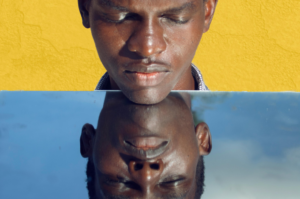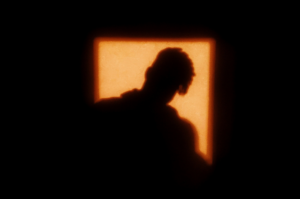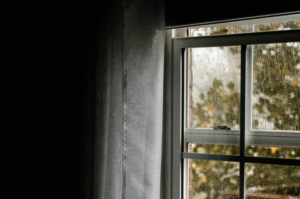
There was a slight disturbance in the realm of the gods. The wives of Nsogbu, the god of mischief, were at it again. Nsogbu, unlike his brothers—who had six very cordial wives each—had only two wives who, like the night and the day, had no common grounds. They quarrelled almost as constantly as the moon changed faces, and any god who tried to intervene would bear the brunt of their quarrel. So today, after the ritual, while the gods had started to sit down to their feast, they started again. Though they pointed and tried to pluck the eyes off each other, no god tried to come between them, push them apart, or say “stop.”
The wives of the eldest brother of Nsogbu wanted very much to side with Onuma, the second wife of Nsogbu. They could have held Onuma’s wrapper above her breasts for her while they encouraged her to rain more abuse and spit on Ekwekwe while the wives, who saw how easily Ekwekwe was beginning to win the argument, wished then to lift her above their heads and hold her up while she threw down verbal blows on Onuma. But they didn’t, couldn’t because they wouldn’t dare put two sisters against each other, and anybody who tried would have to condone with both Onuma’s and Ekwekwe’s fists which were balled and ready. But despite their steady quibble, they had never once come to blows. Surely not because they shared the same parents but perhaps because both were in a certain way fair and couldn’t imagine taking on someone not quite their size. Physically, they were as different as the sun and the moon. Ekwekwe was tall and stringy with a face carved from the finest stone and skin the colour of the darkest oji tree, a whip of a woman who in her youth had been the best dancer the gods could of ever boast. Onuma was stout and matronly, face smooth and attractive like ugegbe and skin the colour of roast groundnut. And maybe because of this—Ekwekwe being whippy and tough and Onuma being grounded and soft—they never engaged physically even at times when their argument grew heated.
As was always the case, they quarrelled over the slightest of things. Today, it over a certain noise amongst the gods that of the two of them, Onuma was the most adored by Nsogbu. This is on account of Nsogbu’s plans the next full moon to present Onuma’s first child, Ekwero, to Akuiliyili – the god of wealth – while Ekwekwe’s child, Iwe, will be presented to the goddess of beauty for blessings.
Ekwekwe couldn’t comprehend this or maybe she didn’t want to. Her child was the first of her husband’s children and should by birthright always get first choice of everything. She couldn’t bear to think it could be because Iwe was a girl and as a girl would do a lot more with the beauty Mmirimma could offer. All Ekwekwe could think about was how much use she herself could have of the wealth from Akuiliyili if Nsogbu presented Iwe to him instead.
Wondering this, she argued, “You lie. There’s no way you’re the most adored.” She shouted and for the sake of the onlookers, she gestured with disdain at Onuma, her face puffed up, her eyes raged. “I’m the first wife. He married you—and I let him—because nobody was asking for your hand, and Nna anyi was getting tired of you in his house.”
Their audience shifted slightly and then settled but no one intervened and not because It wasn’t true, at least more than a little bit of it was. Nsogbu had married Onuma also because, from the very first time Nsogbu brought Ekwekwe into his house as his wife, she had lived up to her name never agreeing to anything Nsogbu wanted. So, he had gone back to her father’s house and returned with Onuma as compensation.
The compensation laughed now—loud and dry—and then, also for the sake of their audience gestured, widely, “Lekwa nu anya o. Hear, hear. I came and our husband knew a little peace. If not for me, he wouldn’t still have you living in his home.” She started to laugh again and Ekwekwe started to gap but the giggle—bright and infective—of a child halted them both.
They turned and stared at their children. Ekwero had Iwe in a headlock while she laughed uproariously and tried to bend over and throw her brother off.
Ekwekwe fumed. She didn’t care for how much alike they looked, tall and gangly and dark. They looked like she had birthed them both on the same day. Not more than one moon apart, they were the closest and fondest of each other. They didn’t care for their mothers’ long-standing difference, even though they were supposed to since this latest argument was because of them.
Not bearing to think of it anymore, Ekwekwe exploded and rounded on her daughter. “You know everybody is hearing my voice because of you, eh? It’s your right I’m fighting for.” She wanted to take her daughter by her arms, shake her furiously, and ask if she couldn’t see what lay ahead. She could tell herself in her heart—without the audience—that she loved Ekwero and Iwe both and didn’t mind whoever got what. Akaraka, the fates, could decide for all she cared but she wouldn’t be telling the whole truth then. She minded very much who would provide her with more ola and gems in the eternity to come. A boy always sought out his mother—his birth mother—first.
“Have you been blinded, eh?” Her hands didn’t grab and shake Iwe but her voice did, and the girl stared at her mother startled beyond confusion.
“Leave her alone.”
Ekwekwe turned to Onuma and they faced each other again. However, before any more words could follow, an unmistakable booming voice rose. “Quiet!”
That single word was simple and innocuous enough yet the voice it was spoken in was thunderous and posed no argument. It was the voice of Chukwu Okike, the father of creation.
When he spoke in that voice that echoed through the Great Hall, no one knew from where exactly he had spoken from until he stepped out from thin air, from the entrance of the hall, amidst hasty bows and reverential praises. His presence brought a cloud of deafening silence onto the room. None of the gods present in the hall could raise their heads and look at him without being completely overwhelmed for weeks, except for children whom he had granted the privilege to gaze upon him without consequence.
He fixed his furious gaze on the sisters and asked, “You dare to disrespect me by fighting in my home on the day of the New Yam Festival?”
Onuma was shaken more than Ekwekwe, thinking to say, “We’re not fighting, Nnam, we’re merely quarreling,” but she didn’t because she knew that Chukwu Okike was aware that in the Seven Days of Peace that preceded the first day of the New Yam Festival, they hadn’t kept the peace and he might decide to punish them for that now. “Forgive me, Nnam,” she said instead.
Ekwekwe did too, and they bowed lower that their heads almost touched their feet.
“You can’t control your wives,” he said to Nsogbu.
Nsogbu kept quiet. He knew it was a statement that warranted no answers and even if it did warant answers, he had no words to give. For almost fifteen planting seasons since he had married them, they had robbed him of words, leaving him only with gaps and signs where they were concerned. He wouldn’t advise any man to take wives and had been advising his six sons against it since cradle.
Chukwu Okike watched him awhile, gauging his reaction, then said, “My Cave of Creation, now!” He swept into the air, the tail of his long ola lined robe the last to disappear, even though his presence lingered.
Only Chukwu Okike and those he invited himself were allowed into his Cave of Creation, so when the crowd reached the entrance, the veil concealing it parted to admit just Ekwekwe and Onuma. When they entered, they saw he was already sitting at his work bench, his finger moving gracefully in tandem to the whirling of his potter’s wheel. Like the Great Hall, the cave was huge and its ceiling adorned by the shiniest kpakpando—creating a starry night—stretched out endlessly. It was not cratered, and boasted only of Chukwu Okike’s essence and his workstation.
He didn’t acknowledge them after they entered until he finished with his most recent creation. It was a fine image of a boy with sharp features, and an even sharper future. Both goddesses could tell by the various bright colours that depicted his aura. He would be born into a poor home, to parents that would had given him the world if they could afford it. It was always so on festive days; Chukwu Okike took time to create only one wonder on those days.
“Today, I make an exception,” he spoke in that roaring voice startling both women who had been in awe of the boy’s look, a look that would rival that of gods. “I shall send you to a wealthy couple who have been barren for fifteen years and they shall call you Ofunwa because, after you, they will have no other. Go now and make a miserable couple happy.” After he had spoken, the portal between the world of gods and the world of men opened, one world to eject the clay image of Ofunwa and the other to welcome the flesh image of him.
After the conception had begun, Chukwu Okike swirled in his bench and motioned both Ekwekwe and Onuma forward. “What is it now?”
They started speaking at once, then they stopped. They turned and faced each other again, fists balled and ready. They were so used to no one coming between them that they didn’t revere Chukwu Okike’s presence.
“You’ll let me speak to our father first.”
“Ha, are you serious? I’m the oldest, I should speak first.”
On and on they went about who would go first. They didn’t notice Chukwu Okike rise slowly from his bench and approach them until he thundered, “keep quiet.”
Alarmed, they both fell back, and as they instinctively reached back with their hands they collided with Chukwu Okike’s potter’s wheel and swept the image of Ofunwa off it. The image clattered to the ground and its hand broke off. In that instant, the conception process was completed and the image of Ofunwa disappeared into the portal without a hand.
“What have you done? That boy has gone to the world of men missing his right hand. He was supposed to be right-handed.”
He wasn’t deterred by the gasps that filled the room. His anger had caused a tear in the veil that protected his Cave of Creation and again an audience was privy to him scolding Ekwekwe and Onuma
“You have harmed a life still innocent, and for this you’ll be punished.”
Ekwekwe and Onuma fell down, their faces to the ground and begged, “Please, Nna anyi. Do not punish us in your anger.” Their children knelt beside them and pleaded with Chukwu Okike and his anger lessened.
“You will take an Oath of Peace.” He wasn’t asking but he waited for them to concede. Their hesitation—though brief—was enough to fan the embers of his anger. He took his stance—wide and unrelenting—stretched out his right hand and his flaming rod appeared in it. “Your punishment would be banishment from Anaola. I would send you to the world of men to live amongst them, but you won’t survive living as them. So instead, I’ll make you into something that would be especially useful to them so no one would harm you. You’ll return home the day you both choose to swear an Oath of Peace, only then can you be what you’ve always been. As I’ve spoken, so it shall be.” He raised his rod, brought it down, and his words were sealed when the flames of the rod burnt brighter and wider.
In a land that had lain dry for more than a century and half after a banished god had conceded and returned to Anaola, water burst out from below it and covered everywhere. And the goddesses were transformed. But since they were bound to their hearts, and Chukwu Okike couldn’t bear separating them from their mothers, their children were transformed too and they became one with their mothers. As bodies of water, Onuma and Ekwekwe were as different as they were before.
Ekwekwe was a beautiful blue—like the sky on a very blithe day—and Onuma was a shiny celadon—like the sky on a stormy day—and such they were confined to spend eternity unless they both agreed to take the Oath of Peace. In the place where there was a sparkly line of blue and grey hues between them, their children met and played but did not mix. And from time to time, as constantly as the moon changed faces, they had their signature quarrel.
We know this because here in the land of mortals, as less as two times a day, we witness a slight disturbance in the place where Lake Ekwekwe and Lake Onuma meet.
Photo by Dazzle Jam from Pexels










Chiji Akọma July 07, 2021 12:14
A great story! Would be worth translating it to its language source--Igbo.